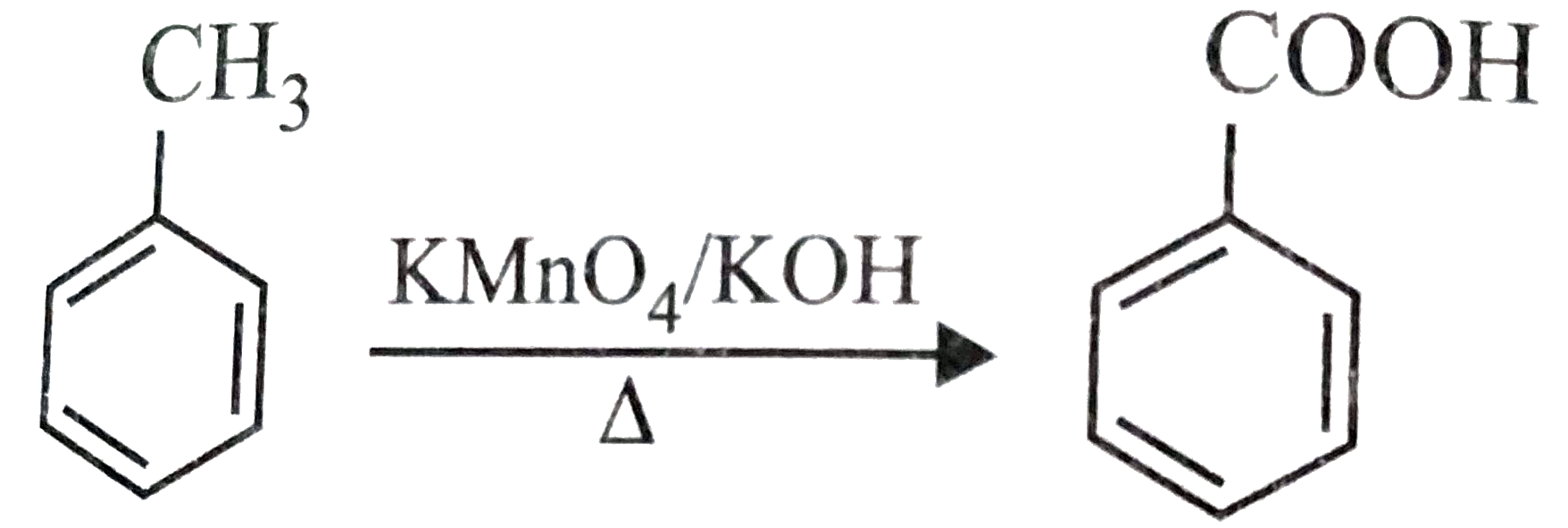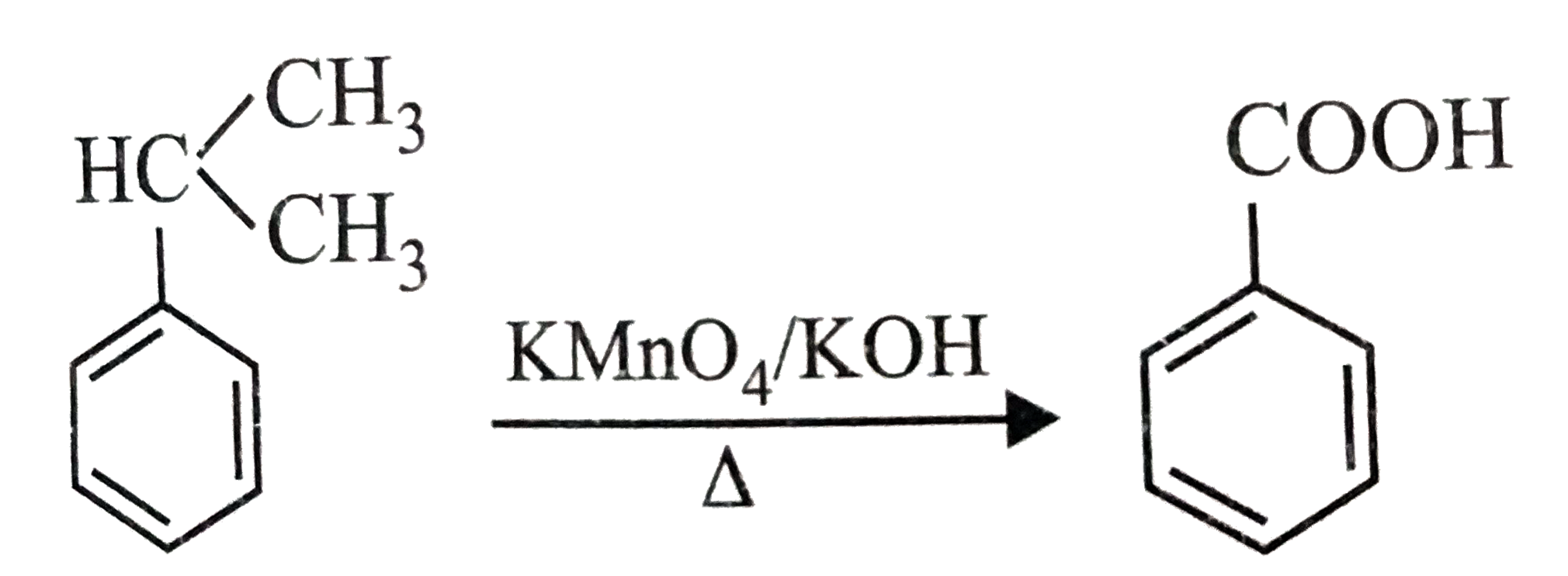Which of the following reactions does not give RCONH2?
R−C≡N+H2OHCl−−→
RCONH4heat−−→
RCNH2/Ni−−−→
(RCO)2O+NH3−−→
The correct Answer is:A,C
To determine which of the following reactions does not give RCONH2, we need to analyze the reactions provided.
1. Understanding the Reactions:
- The question asks about reactions that yield RCONH2, which is an amide.
- We need to consider common reactions that produce amides from their precursors.
2. Thermal Decomposition of Ammonium Salts:
- When ammonium salts are heated, they undergo thermal decomposition to form amides and water.
- The general reaction can be represented as:
\(
RCOONH4 \xrightarrow{\text{heat}} RCONH2 + H2O
\)
- This reaction does produce RCONH2.
3. Reaction of Acyl Chlorides with Ammonia:
- Acyl chlorides react with ammonia to form primary amides.
- The reaction can be represented as:
\(
RCOCl + NH3 \rightarrow RCONH2 + HCl
\)
- This reaction also produces RCONH2.
4. Reaction of Acyl Chlorides with Amines:
- Acyl chlorides can also react with primary and secondary amines to form secondary and tertiary amides, respectively.
- For example:
\(
RCOCl + R'NH2 \rightarrow RCONHR' + HCl
\)
- This reaction produces amides as well.
5. Identifying the Reaction that Does Not Produce RCONH2:
- The question implies that one of the reactions does not yield RCONH2.
- The reaction of ammonium salts when heated produces RCONH2, while the reaction of acyl chlorides with ammonia or amines does produce amides.
- However, if we consider the reaction of ammonium salts with heat, it produces RCONH4 (the ammonium salt of the amide) initially, which does not yield RCONH2 directly upon heating without further steps.
6. Conclusion:
- Therefore, the reaction that does not give RCONH2 is the thermal decomposition of ammonium salts when they are not fully decomposed to yield the amide directly.
Final Answer:
The correct option is B, as it represents the reaction that does not yield RCONH2.
- The question asks about reactions that yield RCONH2, which is an amide.
- We need to consider common reactions that produce amides from their precursors.
- When ammonium salts are heated, they undergo thermal decomposition to form amides and water.
- The general reaction can be represented as:
\(
RCOONH4 \xrightarrow{\text{heat}} RCONH2 + H2O
\)
- This reaction does produce RCONH2.
- Acyl chlorides react with ammonia to form primary amides.
- The reaction can be represented as:
\(
RCOCl + NH3 \rightarrow RCONH2 + HCl
\)
- This reaction also produces RCONH2.
- Acyl chlorides can also react with primary and secondary amines to form secondary and tertiary amides, respectively.
- For example:
\(
RCOCl + R'NH2 \rightarrow RCONHR' + HCl
\)
- This reaction produces amides as well.
- The question implies that one of the reactions does not yield RCONH2.
- The reaction of ammonium salts when heated produces RCONH2, while the reaction of acyl chlorides with ammonia or amines does produce amides.
- However, if we consider the reaction of ammonium salts with heat, it produces RCONH4 (the ammonium salt of the amide) initially, which does not yield RCONH2 directly upon heating without further steps.
- Therefore, the reaction that does not give RCONH2 is the thermal decomposition of ammonium salts when they are not fully decomposed to yield the amide directly.
The correct option is B, as it represents the reaction that does not yield RCONH2.
Topper's Solved these Questions
- AMINESBOOK - VMC MODULES ENGLISHCHAPTER - AMINESEXERCISE - IN CHAPTER EXERCISE E
10 Videos
- AMINESBOOK - VMC MODULES ENGLISHCHAPTER - AMINESEXERCISE - IN CHAPTER EXERCISE F
10 Videos
- AMINESBOOK - VMC MODULES ENGLISHCHAPTER - AMINESEXERCISE - IN CHAPTER EXERCISE -C
10 Videos
- ALDEHYDES,KETONES & CARBOXYLIC ACIDS BOOK - VMC MODULES ENGLISHCHAPTER - ALDEHYDES,KETONES & CARBOXYLIC ACIDS EXERCISE - IN-CHAPTER EXERCISE-M
10 Videos
- ATOMIC STRUCTUREBOOK - VMC MODULES ENGLISHCHAPTER - ATOMIC STRUCTUREEXERCISE - JEE Advanced (Archive )
67 Videos
Similar Questions
Knowledge Check
Which of the following reactions does not occur ?
A B
B C
C D
D
Which of the following reactions does not take place?
AC2H5Br+KNO2→C2H5−O−N=O+KBrB CC2H5Br+AgCN→C2H5NC+AgBrDC2H5Br+KCN→C2H5NC+KBr
CC2H5Br+AgCN→C2H5NC+AgBrDC2H5Br+KCN→C2H5NC+KBr
Which of the following reactions does not take place?
View SolutionWhich of the following reactions does not take place?
View SolutionWhich of the following reaction does not take place ?
View SolutionWhich of the following reduction reactions does not give an amine as product?
View SolutionWhich of the following reaction(s) do/does not give an oxo-acid?
View SolutionWhich of the following compounds does not give N2on heating?
View Solution
